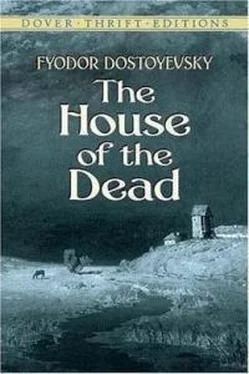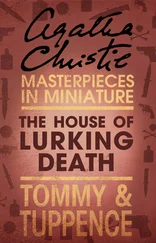How the prisoners all felt for him, and with him when they learned that he was at daggers drawn with our detested Major. That came about a month after his arrival. Their delight knew no bounds. The Major had formerly served with him in the same detachment; so, when they met, after a long separation, they were at first boon companions, but the intimacy could not and did not last. They came to blows—figuratively—and G—kof became the Major's sworn enemy. Some would have it that it was more than figuratively, that they came to actual fisticuffs, a likely thing enough as far as the Major was concerned, for the man had no objection to a scrimmage.
When the convicts heard of the quarrel they really could not contain their delight.
"Old Eight–eyes and the Commandant get on finely together! He's an eagle; but the other's a bad 'un !"
Those who believed in the fight were mighty curious to know which of the two had had the worst of it, and got a good drubbing. If it had been proved there had been no fighting our convicts, I think, would have been bitterly disappointed.
"The Commandant gave him fits, you may bet your life on it," said they; "he's a little 'un, but as bold as a lion; the other one got into a blue funk, and hid under the bed from him."
But G—kof went away only too soon, and keenly was he regretted in the prison.
Our engineers were all most excellent fellows; we had three or four fresh batches of them while I was there.
"Our eagles never remain very long with us," said the prisoners; "especially when they are good and kind fellows."
It was this G—kof who sent B—ski and myself to work in his bureau, for he was partial to exiled nobles. When he left, our condition was still fairly endurable, for there was another engineer there who showed us much sympathy and friendship. We copied reports for some time, and our handwriting was getting to be very good, when an order came from the authorities that we were to be sent back to hard labour as before; some spiteful person had been at work. At bottom we were rather pleased, for we were quite tired of copying.
For two whole years I worked in company with B—ski, all the time in the shops, and many a gossip did we have about our hopes for the future and our notions and convictions. Good B—ski had a very odd mind, which worked in a strange, exceptional way. There are some people of great intelligence who indulge in paradox unconscionably; but when they have undergone great and constant sufferings for their ideas and made great sacrifices for them, you can't drive their notions out of their heads, and it is cruel to try it. When you objected something to B—ski's propositions, he was really hurt, and gave you a violent answer. He was, perhaps, more in the right than I was as to some things wherein we differed, but we were obliged to give one another up, very much to my regret, for we had many thoughts in common.
As years went on M—tski became more and more sombre and melancholy; he became a prey to despair. During the earliest part of my imprisonment he was communicative enough, and let us see what was going on in him. When I arrived at the prison he had just finished his second year. At first he took a lively interest in the news I brought, for he knew nothing of what had been going on in the outer world; he put questions to me, listened eagerly, showed emotion, but, bit by bit, his reserve grew on him and there was no getting at his thoughts. The glowing coals were all covered up with ashes. Yet it was plain that his temper grew sourer and sourer. " Je hais ces brigands ," [10] French in the original Russian.
he would say, speaking of convicts I had got to know something of; I never could make him see any good in them. He really did not seem to fully enter into the meaning of anything I said on their behalf, though he would sometimes seem to agree in a listless sort of way. Next day it was just as before: " je hais ces brigands ." (We used often to speak French with him; so one of the overseers of the works, the soldier, Dranichnikof, used always to call us aides chirurgiens , God knows why!) M—tski never seemed to shake off his usual apathy except when he spoke of his mother.
"She is old and infirm," he said; "she loves me better than anything in the world, and I don't even know if she's still living. If she learns that I've been whipped―"
M—tski was not a noble, and had been whipped before he was transported. When the recollection of this came up in his mind he gnashed his teeth, and could not look anybody in the face. In the latest days of his imprisonment he used to walk to and fro, quite alone for the most part. One day, at noon, he was summoned to the Governor, who received him with a smile on his lips.
"Well, M—tski, what were your dreams last night?" asked the Governor.
Said M—tski to me later, "When he said that to me a shudder ran through me; I felt struck at the heart."
His answer was, "I dreamed that I had a letter from my mother."
"Better than that, better!" replied the Governor. "You are free; your mother has petitioned the Emperor, and he has granted her prayer. Here, here's her letter, and the order for your dismissal. You are to leave the jail without delay."
He came to us pale, scarcely able to believe in his good fortune.
We congratulated him. He pressed our hands with his own, which were quite cold, and trembled violently. Many of the convicts wished him joy; they were really glad to see his happiness.
He settled in Siberia, establishing himself in our town, where a little after that they gave him a place. He used often to come to the jail to bring us news, and tell us all that was going on, as often as he could talk with us. It was political news that interested him chiefly.
Besides the four Poles, the political convicts of whom I spoke just now, there were two others of that nation, who were sentenced for very short periods; they had not much education, but were good, simple, straightforward fellows. There was another, A—tchoukooski, quite a colourless person; one more I must mention, B—in, a man well on in years, who impressed us all very unfavourably indeed. I don't know what he had been sentenced for, although he used to tell us some story or other about it pretty frequently. He was a person of a vulgar, mean type, with the coarse manner of an enriched shopkeeper. He was quite without education, and seemed to take interest in nothing except what concerned his trade, which was that of a painter, a sort of scene–painter he was; he showed a good deal of talent in his work, and the authorities of the prison soon came to know about his abilities, so he got employment all through the town in decorating walls and ceilings. In two years he beautified the rooms of nearly all the prison officials, who remunerated him handsomely, so he lived pretty comfortably. He was sent to work with three other prisoners, two of whom learned the business thoroughly; one of these, T—jwoski, painted nearly as well as B—in himself. Our Major, who had rooms in one of the government buildings, sent for B—in, and gave him a commission to decorate the walls and ceilings there, which he did so effectively, that the suite of rooms of the Governor–General were quite put out of countenance by those of the Major. The house itself was a ramshackle old place, while the interior, thanks to B—in, was as gay as a palace. Our worthy Major was hugely delighted, went about rubbing his hands, and told everybody that he should look out for a wife at once, "a fellow can't remain single when he lives in a place like that;" he was quite serious about it. The Major's satisfaction with B—in and his assistants went on increasing. They occupied a month in the work at the Major's house. During those memorable days the Major seemed to get into a different frame of mind about us, and began to be quite kind to us political prisoners. One day he sent for J—ski.
Читать дальше












